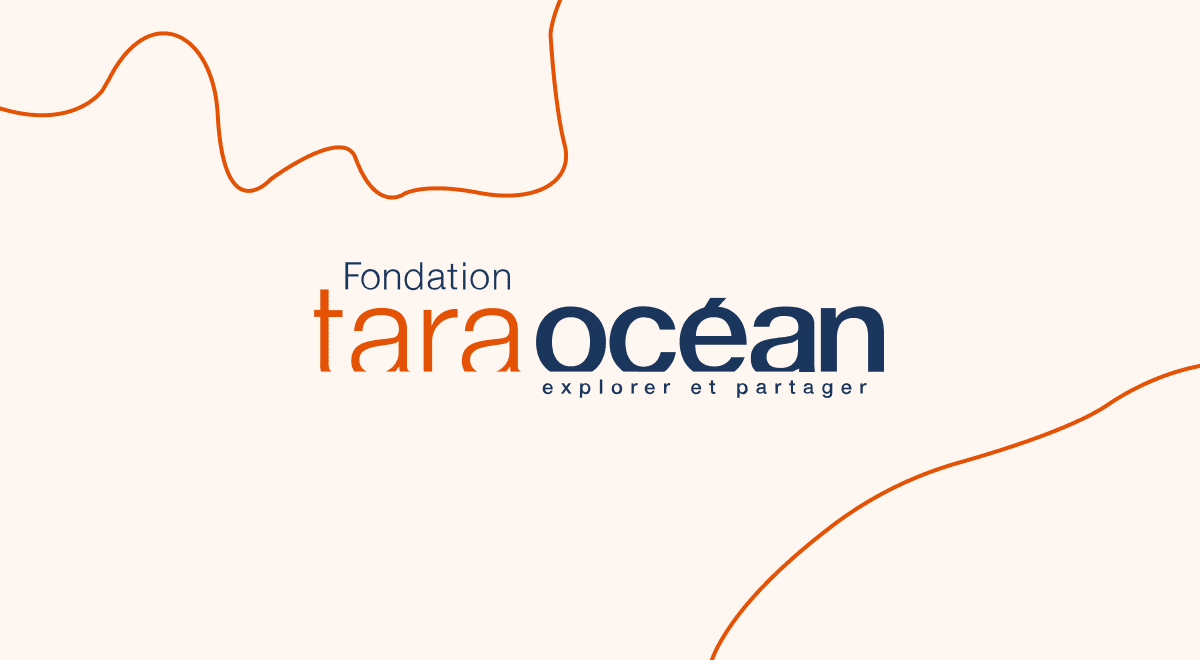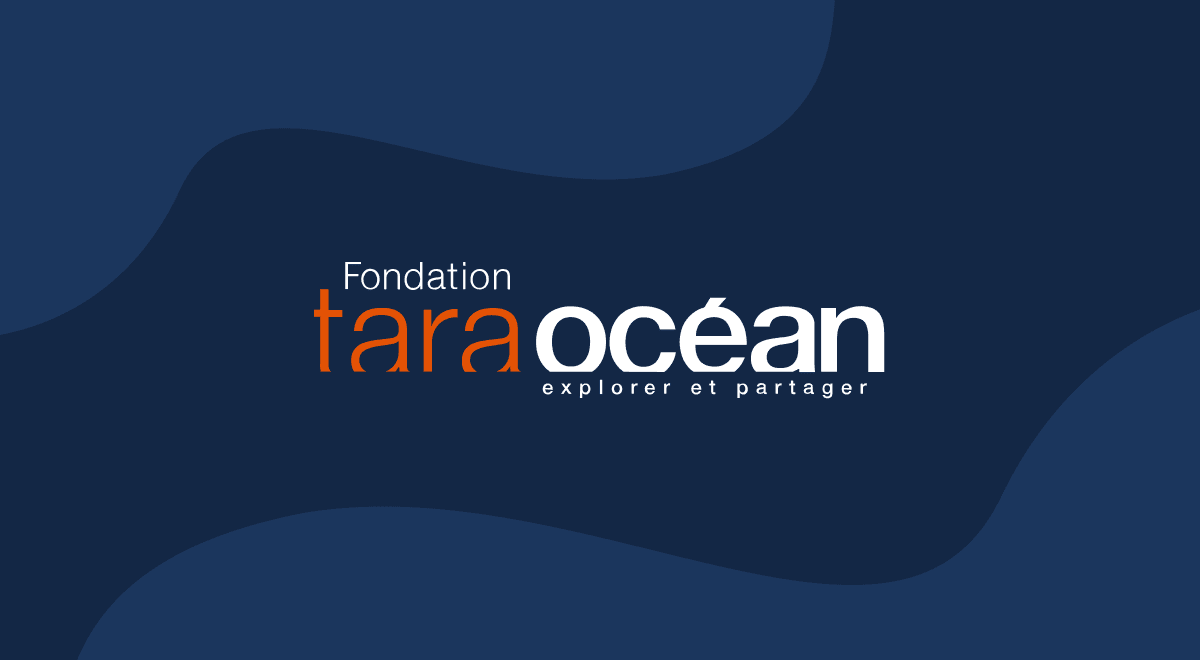20 years of commitment: Conveying the Ocean’s voice and engaging policy makers
For 20 years, the Tara Ocean Foundation has been active in informing the general public about advanced scientific research carried out aboard the schooner and in partner laboratories. Our main objective is to reach policy makers so that the latest scientific data will inform and motivate appropriate concrete actions. At the heart of Tara's advocacy efforts is the preservation of Life. We focus on addressing the impacts of climate change and pollution on marine biodiversity.
André Abreu joined the Tara Ocean Foundation in 2011 after working with the Fondation Danielle-Mitterrand – France Libertés and the UN on the right for all to access drinking water. André looks back at the origin of Tara’s advocacy, its key moments and the Foundation’s daily work to increasingly engage policy-makers.
What is “advocacy” for the Tara Ocean Foundation?
Advocacy consists of sharing knowledge with policy-makers to inform their decisions. It is long-term instructional work — a question of confronting political choices with scientific knowledge and formulating objective recommendations.
The purpose of Tara’s advocacy is to motivate legislation in France and encourage international policy-makers on biodiversity, climate, the high seas and plastic pollution, to better protect and preserve the living Ocean by truly taking into account current dangers.
On a daily basis, the Foundation’s advocacy team creates spaces for dialogue between policy makers and scientists, two very different worlds that usually have little communication. The Foundation relies on the science produced by partner laboratories to inform our actions, and collaborates with scientists so their messages can be relayed to policy-makers. This reciprocal relationship aims to convey the voice of the Ocean at the highest level.
Advocacy is also a collective effort!
To carry the Ocean’s voice even further and make it stronger, the Foundation is joining forces with other stakeholders as a founding member or partner of French and international collectives on climate, biodiversity and plastic pollution.
“Advocacy is collective work. It’s difficult to carry certain topics alone. In the context of monitoring treaties, we need to create partnerships and alliances with other organizations and key political players. The goal is to define and submit our requests en bloc to negotiators, so they will be included in final documents, validated through a 3-step process: negotiations, signature and ratifications. With regard to seabed mining, the Foundation has joined forces with a coalition of NGOs that have identified France, Chile and Costa Rica as strategic countries with strong ambitions against seabed exploitation. Our role is to organize meetings and mobilize all stakeholders to move discussions forward with decision-makers, so that the topic can be taken to the UN institutions”, explains André Abreu.
Advocacy work is a long process, a UN treaty can require over 10 years of negotiations! It’s crucial to build a relationship of trust with policy-makers, which requires long-term planning. This is what the Foundation has been doing for several years on the issues of the high seas and plastic pollution.
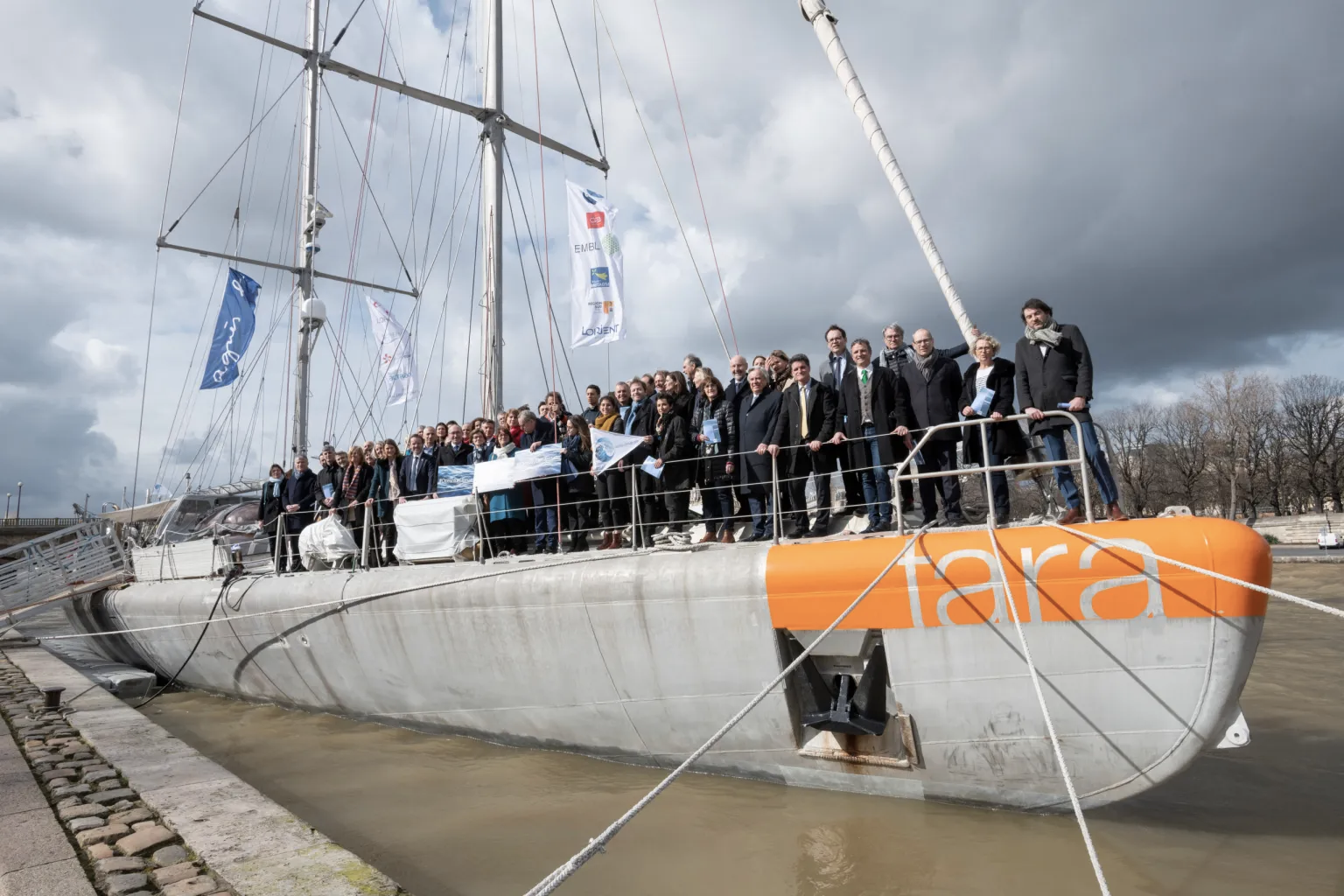
In 2020, the President of the National Assembly and 45 deputies were welcomed aboard the schooner Tara. They called for protection of the Ocean by promoting a proposed resolution for the conservation and sustainable use of the high seas.
Founders committed to preserving the Ocean
The original intuition of the Tara Ocean Foundation’s founders, Agnès Troublé, known as agnès b., already well committed to societal issues, and Étienne Bourgois, was that the schooner’s explorations inform and motivate public debate up to a political commitment to the Ocean and its preservation. “Etienne often says that it’s not just about Tara and science. We have to focus on the issues! Structuring an advocacy division at the Foundation and our presence at the UN comes from both the founders’ intuition and our participation in the Grenelle de la Mer (Grenelle of the Sea) in 2009. Since then, our knowledge of the Ocean has greatly expanded thanks to Tara’s expeditions. Our advocacy work is now structured around 3 major themes: biodiversity, climate and plastic pollution”, André explains.
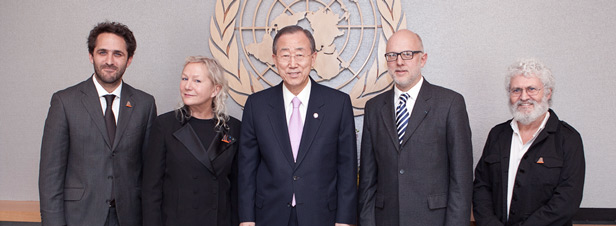
From left to right, Romain Troublé (executive director of the Tara Ocean Foundation), Agnès Troublé also known as agnès b. (designer, founder and sponsor of the Foundation), Ban Ki-moon (former secretary general of the United Nations), Etienne Bourgois (president of the Foundation and CEO of agnès b.), and Eric Karsenti (research director at the EMBL/CNRS (France) and scientific director of the Tara Oceans expedition).
Continued mobilization to recognize the importance of the Ocean at an international level
2012 – Tara mobilized at the Rio+20 French Pavilion
The meeting with Ban Ki-moon, secretary general of the UN, during Tara’s stopover in New York (USA) in January 2012 and in particular his 2-hour visit aboard the schooner on the Hudson River marked the beginning of the Tara Ocean Foundation‘s advocacy work with the UN. Since then, Ban Ki-moon has continued to emphasize the Ocean’s importance via conferences and meetings around the world. In June 2012, during the Rio+20 Conference, the Foundation set up the Blue Pavilion — a space for NGOs to mobilize for the Ocean.
Today, because of disruptions caused by plastic pollution and climate change, the Ocean is increasingly taken into account in political and media discussions. But we must not forget that until 2010, the Ocean was far from occupying the spotlight in international negotiations. It was barely even mentioned behind the scenes.
During the first Earth Summit in Rio, even though Cousteau was a great spokesperson for the Ocean at the time, sustainable development was “green”, meaning that for most people, it was only associated with forest
For many years, environmental advocacy has focused on terrestrial ecosystems, the Amazon, tropical forests and deforestation. Conversely, advocacy for the Ocean was structured by niche: fisheries, whales and coral reefs. It was very rarely integrated into global decisions and roadmaps for the planet. For example, there were no objectives dedicated to the Ocean in theUN Millennium Development Goals (MDGs) set shortly before the end of the 20th century. Not until the Rio+20 Conference and the ensuing Sustainable Development Goals (SDGs) were ocean-specific goals recognized (at the last minute). Also, at this time developed the idea of launching negotiations on biodiversity in the high seas, and mobilization began for a legislative text on the global Ocean based on the logic of sustainable development.
2014 – Tara granted observer status at the UN!
Thanks to this consultative status, the Foundation has access to information, plenary meetings and various working sessions during international negotiations. We are therefore entitled to speak, propose side events, disseminate policy briefs and also engage in dialogue behind the scenes so that important issues can move forward.
According to André Abreu, “without NGOs and independent experts, decision-makers move much slower, if not at all. In a way, we are the eye of society in these very closed and unfortunately not-transparent-enough forums where, in contrast, the interests of the economic world are very well represented. We saw this recently during the COP 28 regarding the big oil companies! In these forums, the Foundation builds a vision for the Ocean, advocates that the high seas be a common responsibility, that the transition from science to politics be more structured and that plastic pollution (for instance) be a major international issue.”
2015 – The Tara Ocean Foundation at the heart of the mobilization during the COP 21
With the creation of the Ocean & Climate Platform in 2013, of which the Foundation is one of the very first founding members, NGOs came together to work on the links between climate and marine biodiversity. Thanks to their strong mobilization during the COP 21, a unique, common message carried in force and in cooperation with Island States and France, the Ocean was mentioned for the first time in a UN climate treaty. Also, on this occasion disruptive phenomena observed in the Ocean were used as an essential argument to demonstrate the seriousness of the climate crisis.

Thanks to the scientific data generated by the partner laboratories of Tara’s expeditions, the Foundation demonstrated that the Ocean is acidifying, losing oxygen, and the rise in surface water temperatures has an impact on marine biodiversity. These results were decisive and allowed the Ocean to be brought to major climate discussions. “The Tara Oceans expedition showed the effects of temperature on the migration of organisms and that an increase in temperatures could have a large impact on the natural processes of the Ocean”, André Abreu explains.
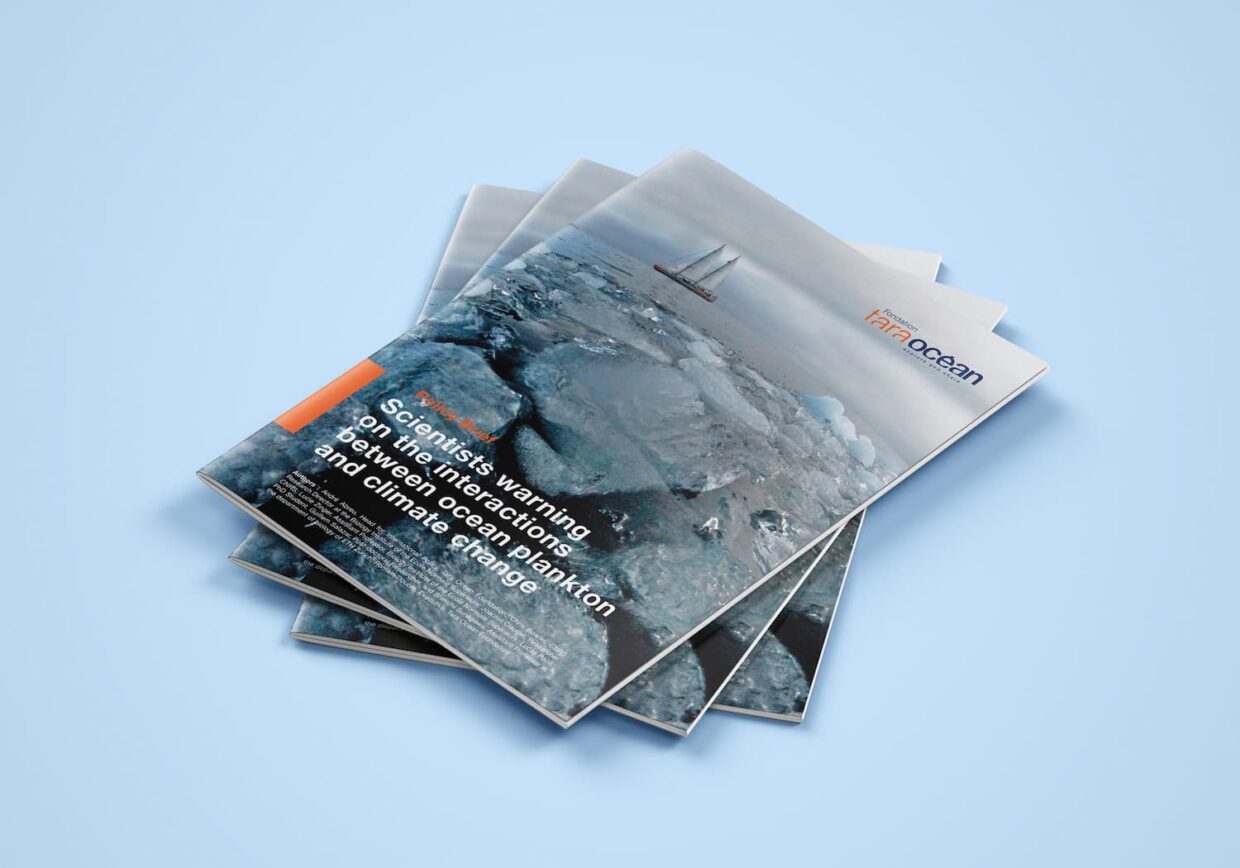
Plastic pollution: 10 years of supporting stakeholders toward a circular economy approach
Among the first to sound the alarm about this scourge as early as 2009, the Foundation started studying plastics at sea during the Tara Mediterranean expedition in 2014. From the observation that we find ourselves powerless at sea in the face of plastic pollution and that the solutions are on land, Tara’s advocacy has been structured around the concept of circular economy. The idea is to mimic the functioning of nature, especially in the aspects of economy of means and absence of harm to life. A concept that translates into the “3R” strategy: reduce, reuse, recycle. These 3 principles have hierarchical, but also complementary value. Recycling is not enough: To move toward the objective of circularity, on the one hand, every plastic object that does not fulfill an essential societal use (over-packaging, gadgets, etc.) must be eliminated. On the other hand, those that have irreplaceable utility must be rethought. It’s also a question of reducing objects’ toxicity, extending their lifespan, and ensuring that they are easily repairable, collected and recyclable at the end of their life. This rich vision of circular economy is the one defended by the Foundation.
KEY DATES: Tara Ocean Foundation’s commitment to fighting plastic pollution :
- 2014 : The Tara Mediterranean expedition showed the omnipresence of plastic pollution from east to west in the Mediterranean — among the most contaminated waters on the planet. This pollution is mainly in the form of microplastics.
- 2015 : Following this observation, at the initiative of the Tara Ocean Foundation, the Foundation Prince Albert II of Monaco, Surfrider Foundation Europe and IUCN, the association Beyond Plastic Med (BeMed) was created in Monaco with the objective of developing initiatives to combat plastic pollution in the Mediterranean Sea.
- 2019 : The Tara Microplastics expedition focused on the 9 largest European rivers in order to identify the flux and typology of plastic pollution. Again, microplastics were massively omnipresent, even well-upstream of megacities such as London and Hamburg.
- 2019-2020 : Based on this global observation of the massive amount and accumulation of plastics in rivers and at sea, the Foundation structured our advocacy on this topic and participated actively in the national negotiations of the no-waste law for a circular economy(loi anti-gaspillage pour une économie circulaire – AGEC) and the National Plastic Packaging Pact. Our ambitions were to reduce unnecessary plastics (overpackaging, fruit and vegetable packaging, promotional packs, small volumes, etc.) and prevent pollution by primary plastics. We pointed out abusive environmental claims of biodegradability and recycling. Finally, we advocated the improvement of extended producer responsibility (EPR) and waste collection schemes, in particular those for beverage packaging.
A joint initiative of the Foundation, Initiatives pour l’avenir des grands fleuves (Initiatives for the Future of Great Rivers) and the Compagnie nationale du Rhône, the Charter “Mon territoire s’engage : rivières et fleuves sans plastique, océan protégé” (My Territory is Committed: Rivers without Plastic, the Ocean Protected), aimed to bring together local decision-makers and promote action. It is now signed by more than 113 signatory communities representing 324 municipalities. A few months later, the Foundation produced a methodological guide for communities, exploring obligations and opportunities for action.
- 2021 : As part of the negotiations on the Climate and Resilience Law (loi climat et résilience), the Foundation raised the subject of plastics with high health and environmental toxicity. Information provided to parliamentarians and economic stakeholders, and dialogue with the media shed light on the case of styrenic plastics, per- and polyfluoroalkyl substances. As a result, their ban was considered.
- 2022 : The United Nations adopted the resolution opening negotiations for an International Plastics Treaty. The Foundation therefore joined the international coalition of NGOs with high ambition for this treaty, aimed at covering the entire life cycle of plastics and legally binding. The second round of negotiations on this treaty, hosted in Paris in 2023, was an opportunity for the Foundation to submit our vision. Improving transparency through a public marketing declaration register, decreasing plastic production by setting global monomer quotas, reducing toxicity by adopting a blacklist, implementing a globalized mechanism of extended producer responsibility allowing the deployment of North-South solidarity systems.
- 2023-2024 : Creation of the Tara Plastics think tank. An informal group of scientists is established. Personalities from basic research, applied and hard sciences, and recently the humanities (economics, sociology, philosophy, etc.) pool their knowledge and visions of the issues posed by plastic pollution and inform Tara’s advocacy, helping explore new avenues of solutions to reconcile the protection of living organisms and human activities
The emergence of the plastic issue at sea shone a light on the Ocean, offering the powerful image of widespread contamination coming from our kitchens. Many people all over the world suddenly became aware of the complexity of this problem and the urgency to act, including on a daily basis. Central theme for companies, policy-makers and citizens, it’s an open door for the Foundation to popularize the concept of One Health (global): raising awareness about the interpenetration of the following themes: plastics, toxicity, climate and socio-economy, and therefore posing the ethical and functional necessity of reconnecting with Life and building a new ontology.
Cooperation projects with the South: A new impetus given to advocacy work with scientists
In 2015, the Foundation became the first foundation of public interest dedicated to the Ocean. The first project initiated in partnership with the French Facility for Global Environment was designed to develop scientific cooperation and advocacy activities with Africa and Latin America. Then, a second project, entitled Plankt’Eco, was launched in 2023. These 2 projects have enabled the Foundation to structure a new aspect of our advocacy with southern countries, but also with scientists.
Towards the development of tools for the management and monitoring of the marine environment
For the next 20 years, Tara’s advocacy will seek to better integrate science into sustainable ocean management processes. Our ambition is to collaborate with scientists to develop new monitoring and prediction tools, and identify more holistic ocean health indicators, integrating data from the marine ecosystem as a whole that will help guide policy-makers. This ambition is already underway with the Plankt’Eco project, whose partner scientists are currently developing 2 innovative tools to define areas to be protected and predict fish stocks.
This shift from research to political action responds to an increasingly urgent need in a rapidly changing world. Bringing scientific data and tools into decision-making processes is as difficult as it is exciting.
Tara’s advocacy is future-oriented!
For the next 20 years, the Foundation’s advocacy work will focus on studying the Ocean and all the major issues affecting it, in order to better preserve marine life. The Foundation will be involved especially in the following themes:
- High seas: The objective is to concretize the protection of this ecosystem and strengthen the notion of common responsibility with the implementation of the Biodiversity Beyond National Jurisdiction Treaty (BBNJ) in 2025. The objective is also to protect or, at least, monitor 100% of the high seas. Setting up deep-sea or hybrid (in between high seas and exclusive economic zones) MPAs with a status of strong protection, and not only regions of interest for science, is a challenge for the Foundation. “It’s crucial to set limits on anthropic activities, fisheries and pollution in the high seas,” André Abreu explains.
- Biodiversity: Our objective is to prevent further deterioration of biodiversity. On the one hand, Tara’s advocacy will be integrated into the framework of the Convention on Biological Diversity (CBD) and the international goal of protecting 30% of the Ocean by 2030 with a vision per decade (40×40 – 50×50). On the other hand, with the TREC/Tara Europa expedition, the Foundation’s advocacy will work on the issues of chemical contamination by defining families of pollutants.
- Polar regions: A great challenge lies ahead of us with the renewal of the Antarctic Treaty in 2047. The Madrid Treaty was one of the greatest victories for the environment through the ban of economic activity in this territory. It is essential to renew this status in the coming years in order to avoid open resources. Thus, the Foundation will start working on this topic and build an advocacy strategy in 2030 with the aim of obtaining an agreement in 2040.
- Plastics: The Ocean is significantly impacted by plastic pollution. The challenge is to achieve an ambitious international treaty that takes into account and addresses the many dimensions of plastic contamination, including toxicity, climate, ecosystem and North-South solidarity. This requires the adoption of drastic reduction goals, not only in terms of volumes marketed, but also of the most harmful polymers and additives.
The Foundation remains more than ever mobilized for today’s and tomorrow’s Ocean — our “life support system” as Dr. Sylvia Earle likes to describe it.
